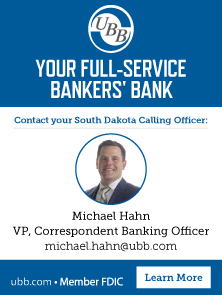- Education & Events
- Advocacy
- Products & Services
- Membership
- Resources
- SDBANKER Magazine
- SDBA eNews
- SDBA eNews Archives
- Legislative Update/Bill Watch
- South Dakota Bank Directory
- Women in Banking
- Scenes of South Dakota Calendar*
- Holiday Signs
- Regulatory Report
- South Dakota Banking Code
- Record Retention Manual
- Advertising & Sponsorship Guide
- COVID-19 Resources
- Mental Health and Crisis Prevention
- About
|
Early-Bird Registration Deadline for the 2023 Annual Convention Ends May 15Register for the 2023 National School for Experienced Ag BankersThe SDBA will host the 2023 National School for Experienced Ag Bankers on June 26-29, 2023 at Black Hills University in Spearfish, S.D. The National School for Experienced Ag Bankers is a seminar for experienced ag bankers who want to further develop their ag lending skills, learn new skills, confirm existing methodology and meet fellow bankers who share the same career path. Taught by a nationally-recognized faculty of bankers, academics and other real-world ag banking practitioners, this program is focused on ag lending opportunities and challenges that are relevant to ag bankers from across the United States. Set in beautiful Spearfish, S.D., right in the center of the United States, students will have ample time to enjoy the scenic Black Hills of South Dakota. Whether you enjoy hiking in Spearfish Canyon, rock climbing in the Black Hills National Forrest, viewing monuments such as Mount Rushmore and Crazy Horse, or just testing your luck at the tables in historic Deadwood, S.D., Spearfish has you covered! Go to www.visitspearfish.com for more details. This school is limited to 72 students. Priority will be given to bank employees and regulators. In the event the school fills, a waitlist will be implemented and students will be chosen on a first-come, first-served basis off the waitlist. Find more information and register here! Bipartisan ACRE Legislation Introduced in the HouseToday, Reps. Randy Feenstra (R-Iowa) and Wiley Nickel (D-N.C.) introduced the Access to Credit for our Rural Economy Act of 2023, or ACRE, to benefit farmers, ranchers and rural communities by providing flexibility to more financial institutions to offer affordable credit to agricultural borrowers. ACRE would reduce interest payments, increasing the cash flow for agricultural operations and reducing the need for off-farm income. ACRE would amend IRS code to level the playing field for community banks to administer agricultural real estate loans by granting them tax exempt status on earned interest. The same exemption already applies to farm credit institutions. The exemption also would apply to single-family home mortgage loans in rural communities with fewer than 2,500 residents and for mortgages less than $750,000. ABA estimates that the legislation would expand access to affordable agricultural and home loans to more than 4,000 rural communities. ACRE would deliver approximately $1.4 billion in annual interest expense savings to farmers and ranchers in 2023—approximately $950 million in annual interest expense savings for loans secured by farmland and $450 million for rural mortgages, according to ABA figures. “This bipartisan legislation will provide critical economic support to rural communities by lowering the cost of credit for rural Americans looking to buy a home or farmland,” said ABA President and CEO Rob Nichols. We urge all members of the House to cosponsor this critically important piece of legislation.” Noting that rising interest rates and record inflation have “stifled” younger producers and prevented rural families from securing home mortgages, Feenstra said Main Street lenders need the flexibility to offer loans at “affordable rates to grow rural communities.” To help raise awareness about the bill, ABA has provided an ACRE toolkit for member banks. ABA, State Associations Urge Passage of SAFE ActAhead of a hearing on the SAFE Banking Act in the Senate Banking Committee, the American Bankers Association and 51 state bankers associations urged lawmakers to advance the bill as soon as possible, emphasizing that it would benefit law enforcement efforts, tax collection and public safety. The ABA-backed bill—which has passed the House in seven times in prior Congresses—was introduced by Sens. Jeff Merkley (D-Ore.) and Steve Daines (R-Mont.) and Reps. Dave Joyce (R-Ohio) and Earl Blumenauer (D-Ore.). Today’s hearing marked the bill’s first consideration in the Senate since 2019. “The inability of the state-licensed cannabis industry to access safe and regulated financial services is a pressing concern for so many of our nation’s communities and the banks that serve them,” the associations wrote. “With state-licensed cannabis businesses currently authorized in 38 states and more states weighing legalization, we urge you to address these critical issues by marking up and advancing the SAFE Banking Act as quickly as possible.” During the hearing, Sen. Merkley—who testified as one of the bill’s key sponsors—also emphasized the money laundering risks that exist due to the legal cannabis industry’s cash economy. “There is nothing like a cash economy to facilitate money laundering,” he said. “The lack of electronic records in this world makes it really easy to move money that shouldn’t be moved.” FDIC Announces Details of Deposit Insurance Special AssessmentThe FDIC board today voted 3-2 to propose a special assessment to make up for losses to the Deposit Insurance Fund caused by regulators’ decision to declare a systemic risk exception in the failures of Silicon Valley Bank and Signature Bank. Starting with first quarter of 2024, the FDIC would impose a special assessment on the excess of an independent bank’s estimated uninsured deposits in excess of $5 billion as of last December, or the same for bank holding companies’ consolidated estimated insured deposits (allocated over the subsidiary banks). The assessment rate will be approximately 12.5 basis points. The special assessment would be collected over eight quarters, based on the estimated cost of the systemic risk declaration. However, the $15.8 billion estimate—lower than originally estimated—would be adjusted quarterly as assets from SVB and Signature are sold and receivership expenses are recovered, which could result in changes to the assessment rate or period. FDIC staff determined that 113 banking organizations would be subject to the assessment—none with less than $5 billion in assets; 65 between $5 billion and $50 billion; and 48 larger institutions. Those larger than $50 billion would pay more than 95% of the assessment. FDIC staff estimated that, if the special assessment were imposed in one quarter only, the affected banks’ income would be reduced by an average 17.5% and capital would be reduced by less than 1%. In a statement, American Bankers Association President and CEO Rob Nichols said the association is reviewing the assessment, but it appreciates the FDIC’s decision to exclude most community banks. “Once we receive input from our members, we will be prepared to provide industry feedback to the FDIC on the special assessment, the timing of the expense, and the ongoing increase in quarterly Deposit Insurance Fund assessments on banks,” Nichols said. “More broadly, we continue to engage with regulators and members of Congress on further measures to enhance confidence in the banking system and financial markets, including increased scrutiny of predatory short selling and a discussion of potential deposit insurance reforms that could allow banks of all sizes to better serve their customers and communities.”
Nichols: Regulators Should Monitor Possible Bank Stock ManipulationIn an interview today on Yahoo Finance, American Bankers Association President and CEO Rob Nichols reiterated the association’s recent call for the Securities and Exchange Commission to investigate short selling of bank stocks for possible illegal activity. ABA on Thursday sent a letter to SEC Chairman Gary Gensler noting the disconnect between some banks’ earnings reports and recent plunges in their stock value. That same day, Gensler released a statement saying that the agency is focused on identifying and prosecuting any misconduct that takes advantage of increased volatility and uncertainty in markets. Nichols said he was pleased to see Gensler’s statement. “We’ve asked the SEC… to use all of their enforcement tools to make sure that you’re not seeing market manipulation or any predatory shorting—which would be illegal activity, frankly—that we’re concerned about, because some of those share price movements just don’t make any sense.” As one example, he pointed to a report in a U.K. media outlet that cited anonymous sources who claimed a U.S. bank was exploring a sale—a claim that the bank said was false. The report caused the bank’s stock value to briefly tumble. Nichols also reiterated that the U.S. banking sector remains strong and resilient. “Obviously we’ve been in a period of some turmoil,” he said. “But a lot of what we’ve seen with regard to those couple of [failed]institutions was really idiosyncratic and local to those institutions, not representative of the entire U.S. banking sector, which is on solid footing.”
CISA News: Apple & Google Partner on Preventing Bluetooth Stalking
Apple and Google have formed an alliance to draft a technical standard to combat “Bluetooth Stalking” – the malicious use of using tracking devices to target innocent victims.
|




